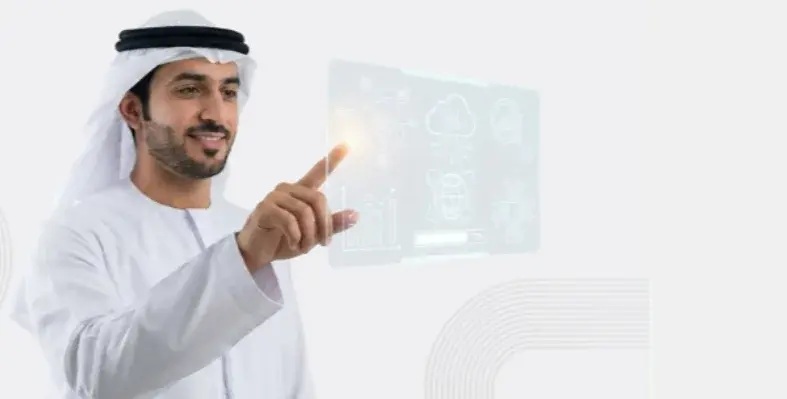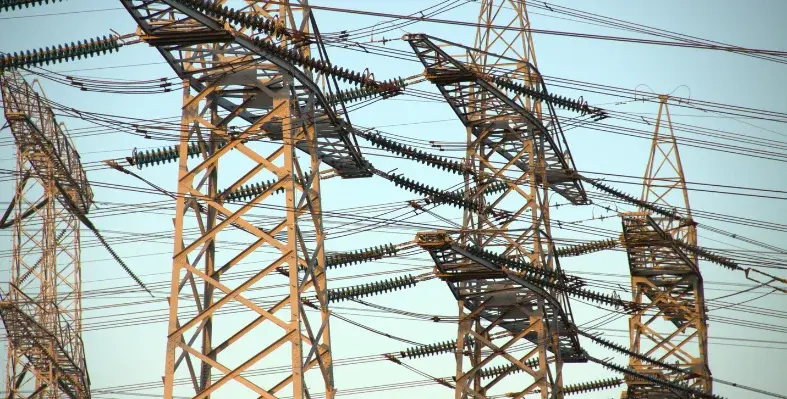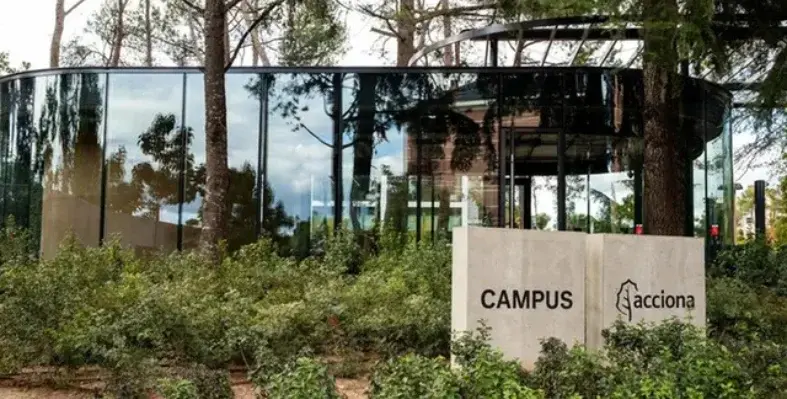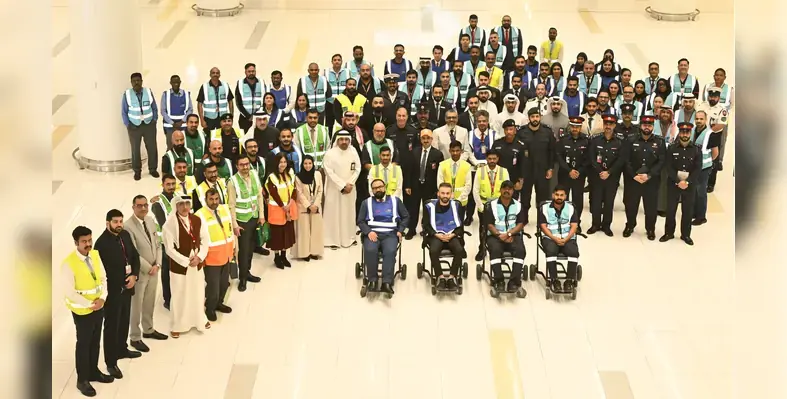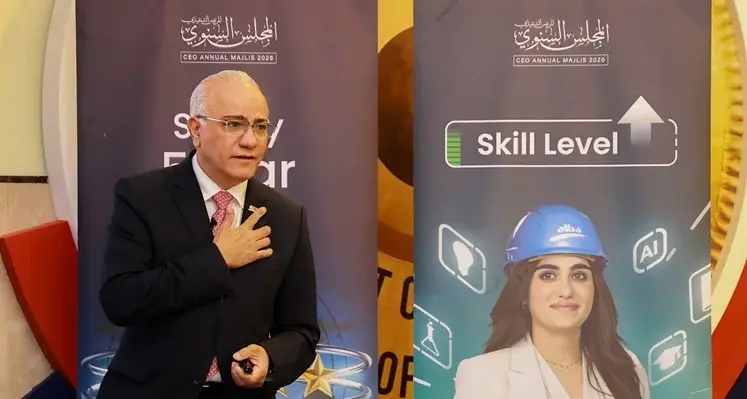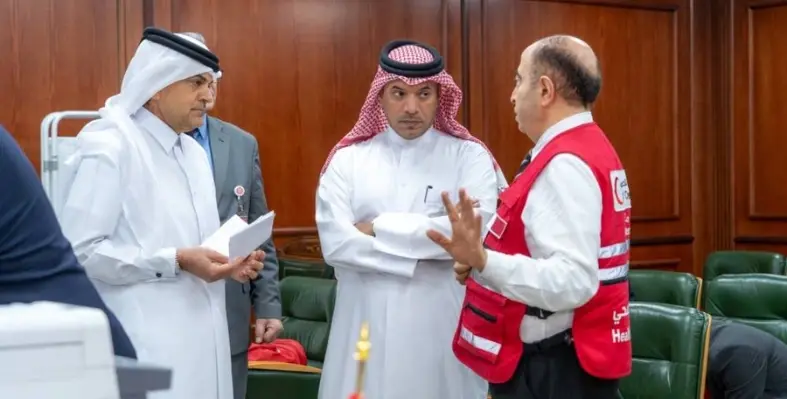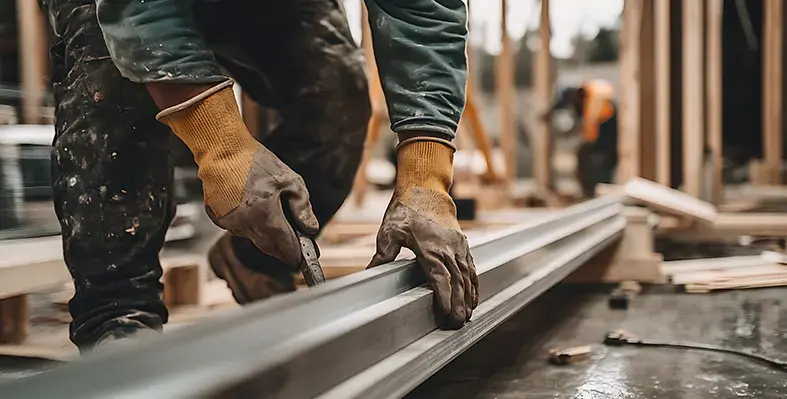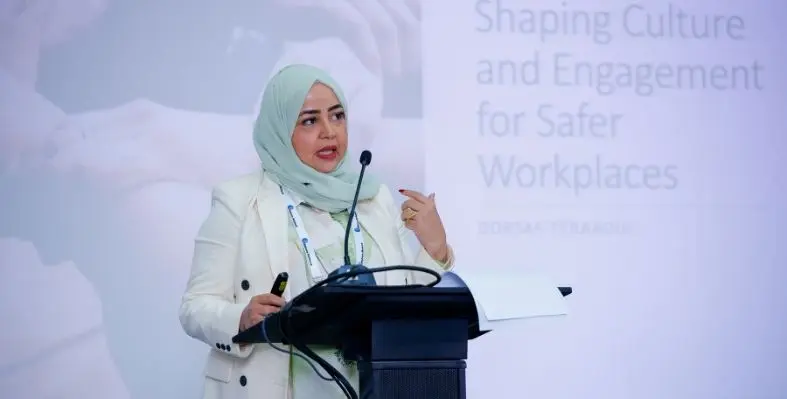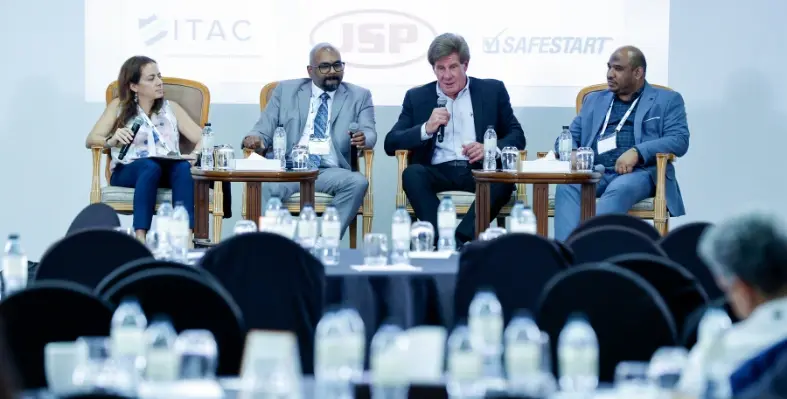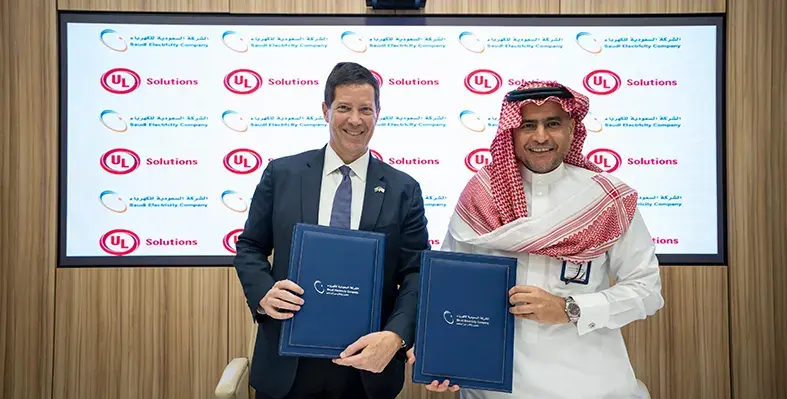Regional Coverage
Regional Coverage
- Details
- Matthew Hayhoe
- Middle East
- Topic: HSE
- Region: Middle East
- Year: 2026
The Ministry of Human Resources and Emiratisation (MoHRE), in collaboration with local and federal government partners, has launched the ‘Emirati Work Bundle in Private Sector’, a new initiative designed to deliver integrated, proactive digital employment services for Emirati citizens working in the private sector, as well as for employers
The work bundle provides a comprehensive, end-to-end service journey, covering everything from registration on the Nafis platform and job placement through to enrolment in pension and social security systems. The initiative supports the UAE’s broader Emiratisation strategy, while advancing digital transformation and reinforcing leadership in government service delivery, in line with the objectives of the Zero Government Bureaucracy Programme.
Built on high levels of intergovernmental integration, the Emirati Work Bundle leverages real-time data sharing between MoHRE and a wide range of federal and local entities. These include the Federal Authority for Identity, Citizenship, Customs, and Port Security (ICP); General Pension and Social Security Authority (GPSSA); Emirati Talent Competitiveness Council; Abu Dhabi Pension Fund; Department of Health – Abu Dhabi; Emirates Health Services; Dubai Health; and the Digital Dubai Authority. The integration aims to reduce duplication, improve compliance, and accelerate service delivery across employment, health, and social protection systems.
His Excellency Khalil Khoori, Undersecretary of Labour Market and Emiratisation Operations at MoHRE, said, “The new launch enhances the customer journey by streamlining procedures and reducing employment requirements for UAE citizens and employers. It covers the full process from the moment an Emirati citizen registers on the Nafis platform and begins their job search, until their appointment in a private-sector job, along with their registration in the UAE’s pension and social security systems.”
From a governance and security perspective, His Excellency Major General Saeed Salem Balhas Al Shamsi, Acting Director General of Identity and Foreigners Affairs at ICP, highlighted the role of data integration in service resilience, stating, “The new work bundle for citizens strengthens the UAE’s model for secure digital solutions, ensuring service efficiency and advancing Zero Government Bureaucracy by integrating data among all partners, which contributes to providing an excellent and swift service for both the Emirati citizen and the employer.”
Similarly, His Excellency Khalaf Abdullah Rahma Al Hammadi, Director General of the Abu Dhabi Pension Fund, emphasised the importance of early and accurate registration to strengthen social protection mechanisms. “Launching the new Emirati Work Bundle highlights the advanced model of integrated government operations implemented at both the local and federal levels. It embodies the UAE’s vision in aligning efforts and enhancing data integration among relevant entities, which allows for providing an outstanding experience for customers. This integration underscores the importance of early and accurate registration in pension systems, which strengthens the social protection system and guarantees pension rights for Emirati citizens.”
For private-sector organisations, including those operating in high-compliance and safety-critical industries, the initiative represents a significant step towards simplified onboarding, improved regulatory alignment, and more efficient workforce management.
- Details
- Matthew Hayhoe
- Middle East
- Topic: HSE
- Region: Middle East
- Date: 22nd January 2026
- Year: 2026
Shaikh Khalid bin Abdullah, Bahrain's Deputy Prime Minister, inaugurated the 400 kV Al Jasra power station on behalf of His Royal Highness Prince Salman bin Hamad Al Khalifa, the Crown Prince and Prime Minister. The facility represents the largest electricity transmission station in the Kingdom
The Deputy Prime Minister conveyed his congratulations to His Majesty the King and to His Royal Highness the Crown Prince and Prime Minister on the successful completion of this strategic national infrastructure project, which contributes to Bahrain’s long-term development and energy security objectives.
He stated that the commissioning of Al Jasra power station marks a significant milestone in the evolution of the national electricity transmission network, which dates back to 1930 when Manama became the first capital in the Gulf region to be electrified. This continuous development, initiated during the era of His Highness Isa Al Kabeer, reflects a sustained commitment to institutional growth, infrastructure resilience, and service reliability.
Shaikh Khalid bin Abdullah emphasised that the project supports Bahrain's ongoing modernisation efforts, strengthening critical infrastructure while aligning with sustainable development and long-term planning frameworks.
He noted that the Al Jasra station plays a vital role in enhancing the stability, capacity, and operational reliability of the national electricity grid. The project supports increased urban development and investment activity, improves service quality, and ensures the safe and efficient management of current and future electricity demand.
The Deputy Prime Minister further highlighted that the project was delivered in accordance with international technical and safety standards, in collaboration with leading global companies. This reflects Bahrain’s strong capability in managing complex, high-risk energy infrastructure projects while maintaining stringent health, safety, and environmental requirements.
He commended the Electricity and Water Authority (EWA), led by its President Kamal bin Ahmed Mohammed, along with project teams and relevant stakeholders, for completing the project on schedule and to high technical standards, recognising the effectiveness of national expertise, inter-agency coordination, and robust project governance.
In his remarks, Kamal bin Ahmed Mohammed expressed his appreciation to Shaikh Khalid bin Abdullah for inaugurating the project and for the close oversight provided through the Ministerial Committee for Development and Infrastructure Projects, which ensured timely decision-making, effective risk mitigation, and the resolution of technical and logistical challenges.
The EWA President explained that the project involved the construction of a 400/220 kV transmission station in Al Jasra, the installation of more than 120 km of 400 kV high-voltage cables and approximately 96 km of 220 kV cables, and their full integration into the national transmission network in accordance with international grid safety and performance requirements.
He added that the project upgraded the Gulf Cooperation Council (GCC) interconnection from 200 kV to 400 kV, increasing interconnection capacity from 926 MW to 1,359 MW, thereby improving cross-border energy exchange efficiency, system resilience, and regional grid stability.
The project also increased total transformer capacity from 975 MVA to 2,000 MVA, reducing electrical loading in the Riffa area by up to 25% and significantly enhancing the reliability, redundancy, and operational safety of the transmission network.
He concluded that the Al Jasra power station is among Bahrain’s most significant national energy infrastructure projects, delivered through integrated packages covering substations, switchgear, transformers, reactors, high-voltage cabling, consultancy services, and engineering supervision, in full alignment with international technical, safety, and environmental standards.
- Details
- Matthew Hayhoe
- Middle East
- Topic: HSE
- Region: Middle East
- Date: 20th January 2026
- Year: 2026
ACCIONA has been recognised as a Top Employer in Qatar for the second consecutive year, reinforcing its position as the only Spanish company to renew the certification in the Middle East and underlining its continued growth and consolidation in the region.
The Top Employer 2026 certification is awarded by the Top Employers Institute, one of the most demanding and prestigious global bodies assessing excellence in people management. The recognition acknowledges ACCIONA’s performance across a wide range of human resources practices, including people strategy, work environment, talent acquisition, learning and development, employee well-being, and diversity and inclusion.
ACCIONA’s renewed certification in Qatar reflects the company’s long-term commitment to embedding strong people-focused practices across its operations, particularly as it expands its services and project portfolio in the country. The company said its approach is centred on creating an inclusive, supportive and development-oriented workplace that aligns with both global standards and local priorities.
Beyond the Middle East, ACCIONA has also retained its Top Employer certification across several European and international markets, including Spain and Portugal, alongside Brazil, Mexico, Australia, the United States, Canada, Chile, South Africa, Peru and the Philippines. This broad geographical recognition highlights the company’s consistent global approach to human resources management and its ability to apply the same high standards across diverse operating environments.
These individual country certifications have contributed to ACCIONA receiving the Top Employers North America Seal, which identifies the company as one of the leading employers on the continent. In addition, ACCIONA has been awarded the Enterprise Seal for the second time, a distinction reserved for companies certified in at least 10 countries representing more than 95% of their global workforce. According to the Top Employers Institute, only 12 companies worldwide have achieved this level of recognition.
ACCIONA’s people management strategy is driven by its global PEOPLE plan, which places employees at the centre of the company’s business model. The plan guides the management of more than 68,000 professionals worldwide and focuses on fostering talent development, promoting sustainability, and ensuring inclusive and accessible workplaces.
In Qatar, the PEOPLE plan translates into a strong emphasis on internal talent development, sustainability initiatives, inclusion and accessibility. These pillars support the growth of ACCIONA Service in the country and reinforce the company’s long-term commitment to contributing to Qatar’s economic and social development through a stable and engaged workforce.
- Details
- Louise Waters
- Middle East
- Topic: Training
- Region: Middle East
- Date: 19th January 2026
- Year: 2026
Bahrain Airport Company (BAC), the operator and managing body of Bahrain International Airport (BIA), in collaboration with Bahrain Civil Aviation Affairs, has announced the successful completion of a partial evacuation exercise
The drill was designed to rigorously test the effectiveness of the airport's emergency evacuation plans and ensure the highest level of readiness among all emergency response teams. It involved coordinated efforts among personnel from BAC, Gulf Air Group, Airport Police, the Executive Office of National Disaster Committee, Bahrain Customs Affairs, Nationality, Passports and Residence Affairs, and Bahrain Airport Services.
The simulation provided invaluable insights into operational procedures, communication protocols, and coordination mechanisms during a simulated emergency scenario. The seamless cooperation and collaboration among all entities involved was pivotal to the drill's success, according to BAC.
Mohamed Yousif Alsayed, vice president, Airport Emergency Services, Health, Safety and Environment at BAC, said, "The safety of our passengers, personnel, and stakeholders remains our utmost priority. Conducting such comprehensive exercises is fundamental to our commitment to operational excellence and emergency preparedness. This drill not only tested our plans under pressure but also strengthened the invaluable partnerships that are crucial for ensuring a swift and effective response to any potential incident at Bahrain International Airport."
This initiative is a core component of BAC’s ongoing strategy to continually evaluate, refine, and enhance its safety and security protocols, with a commitment to maintaining the highest international standards.
- Details
- Sania Aziz
- Middle East
- Date: 15th January 2026
- Year: 2026
The National Cyber Security Center (NCSC) of the Kingdom of Bahrain and SandboxAQ, a global leader in AI-driven cybersecurity and cryptographic management, have announced a landmark partnership to establish a nationwide cybersecurity modernisation framework. The collaboration represents one of the world’s first large-scale initiatives to transition towards a quantum-safe economy, addressing emerging threats from quantum computing and advanced cyber attacks.
As a founding member of the UNICC AI Hub on Post-Quantum Cryptography (PQC), SandboxAQ will assist Bahrain in securing sovereign data, critical infrastructure, and sensitive government and private-sector systems. The partnership aims to protect against rapidly evolving cyber, cryptographic, and quantum computing threats, ensuring Bahrain’s digital assets remain resilient in the face of future technological developments.
The announcement comes amid growing global concerns about “Q-Day,” the point at which cryptographically relevant quantum computers (CRQCs) will be capable of breaking today’s widely used encryption. While experts project that CRQCs could be viable as early as 2029, the risk is already present through “harvest-now, decrypt-later” attacks. Such attacks involve stealing encrypted data today with the intention of decrypting it once quantum capabilities advance. For governments, this threat encompasses classified communications, diplomatic cables, defence information, national identity records, and decades of sensitive archives.
Under the partnership, Bahrain will deploy SandboxAQ’s AQtive Guard platform, an AI-powered cybersecurity solution designed to enable the safe, large-scale deployment of AI agents while modernising defences for the post-quantum era. The platform provides comprehensive visibility, assessment, and remediation of critical vulnerabilities resulting from weak encryption and the proliferation of AI agents and non-human identities (NHIs). The deployment will cover more than 60 ministry environments across the Kingdom, requiring the platform to manage cryptographic security on a national scale.
His Excellency Shaikh Salman bin Mohammed Al Khalifa, CEO of the NCSC, said, “This partnership with SandboxAQ marks a significant milestone in our mission to secure our sovereign data, intellectual property, and other digital assets from both internal and external cyber threats. SandboxAQ’s world-class technologies and expertise in AI-driven cybersecurity will help Bahrain protect its citizens, businesses, and government agencies and lay the foundation for a new era of security and economic growth in the Kingdom.”
Mohammed Aboul-Magd, Vice President of Product, Cybersecurity at SandboxAQ, added, “Bahrain is taking a bold and much-needed step by not only setting policy, but by operationalising the technology required to secure the Kingdom against rapidly advancing threats. Our partnership establishes a dynamic framework that allows the country to adapt quickly as new vulnerabilities emerge, ensuring the nation stays ahead of attackers in a world where cryptographic risks evolve by the day. We are honoured to support Shaikh Salman and the Government of Bahrain in implementing this forward-looking programme, which sets a new benchmark for cyber resilience across the region.”
The initiative forms a central pillar of Bahrain’s long-term cybersecurity strategy, reinforcing the Kingdom’s commitment to safeguarding national data, promoting economic resilience, and advancing secure digital transformation.
- Details
- Louise Waters
- Middle East
- Topic: HSE
- Region: Middle East
- Date: 14th January 2026
- Year: 2026
Aluminium Bahrain B.S.C. (Alba) has set safety and upskilling as top priorities for 2026
At its Annual Majlis 2026 sessions held on 12 January, Alba’s CEO Ali Baqali unveiled Alba’s objectives for 2026: Safety 5 Star, Think Global, e-F Al Hassalah, and Skill Level Up. These priorities aim to drive Alba’s operational excellence, strengthen financial discipline and position the company for sustained growth, according to a company statement.
CEO Ali Al Baqali said, “As we step into 2026, our focus is clear: driving world class safety excellence and best-in-class behaviours across all our operations; expanding beyond our comfort zone to explore new markets and opportunities; accelerating efficiencies and financial discipline through the last phase of e-Al Hasalah; and investing in our people with Skill Level Up for the future. These priorities will guide us as we continue to lead, inspire and transform.”
The inaugural session, attended by Alba’s executives, directors, managers and supervisory staff highlighted key performance milestones from 2025 and outlined the strategic direction for the year ahead.
Two more sessions of Alba’s Annual Majlis – which stands for “yearly gathering or forum” in Arabic – will be held throughout the week in a hybrid format, ensuring accessibility for employees across all sites and shifts. This initiative is designed to foster open dialogue between the company’s management and employees, promoting transparency, collaboration, and alignment on shared goals.
Alba has a longstanding commitment to health and safety and an outstanding safety record. This is reflected in a number of safety achievements this year, including the milestone of over 42 million work hours without a Lost Time Injury (LTI) in December 2025, marking an unprecedented two consecutive years of LTI-free operations - a first in the company’s five-decade history. The company’s commitment to cultivating a world-class safety culture for its workforce has been recognised this year with the award of the ‘Excellence in Safety’ Award from the Lifting Equipment Engineers Association (LEEA), Royal Society for the Prevention of Accidents (RoSPA’s) President’s award for the third consecutive year, British Safety Council 2025 International Safety Award and several major awards from the USA’s National Safety Council (NSC).
- Details
- Sania Aziz
- Middle East
- Date: 14th January 2026
- Year: 2026
Qatar International Islamic Bank (QIIB) hosted a Health Day for its employees at the Bank’s headquarters, in partnership with Qatar Red Crescent, reinforcing an ongoing collaboration between the two organisations.
Held at the end of December 2025, the initiative aimed to raise awareness about common health issues, promote daily wellness practices, and encourage employees to adopt a sustainable, healthy lifestyle. The event also formed part of QIIB’s broader commitment to enhancing occupational safety standards well into 2026.
Employees from across the Bank’s departments and divisions actively participated in the Health Day, reflecting QIIB’s dedication to fostering a workplace that prioritises public health, prevention, and self-care. The programme included a series of interactive medical screenings designed to increase health awareness and enable employees to take proactive steps towards well-being. Screenings offered during the event included blood pressure checks, blood sugar testing, body mass index (BMI) measurements, and vision assessments, along with specialised health consultations tailored to individual needs. These activities provided employees with a clear understanding of their current health status and practical guidance on improving their lifestyle habits.
Commenting on the initiative, Ali Hamad Al-Mesaifri, Chief of Human Resources and Administration at QIIB, said, “We organised this Health Day because we believe that good health is essential to building a stable and sustainable institution. A healthy employee is better equipped to contribute, innovate, and perform, which in turn enhances overall work quality and the work environment. Our focus on the health and well being of all employees also supports Qatar National Vision 2030, which highlights the importance of health as a key pillar of human development.”
He added, “At QIIB, we are keen to adopt impactful initiatives that raise health awareness and encourage our employees to take care of their daily well-being, not only through medical check-ups, but also by promoting a culture of prevention and supporting a healthy, balanced lifestyle.”
Al-Mesaifri emphasised the significance of the partnership with Qatar Red Crescent, noting, “Our collaboration with Qatar Red Crescent reflects the Bank’s commitment to partnering with leading national institutions known for their extensive expertise. Initiatives like this demonstrate QIIB’s dedication to its social responsibility toward its employees and its ongoing efforts to provide a work environment that supports both physical and mental well-being.”
Concluding his remarks, he said, “We hope this initiative will encourage our employees to take full advantage of the screenings and consultations offered, and to continue prioritizing their health. QIIB remains committed to organizing similar health-focused initiatives that align with our institutional vision.”
Through events such as this Health Day, QIIB continues to reinforce a culture of health, prevention, and employee well-being, integrating these values into its organisational ethos.
- Details
- Middle East
- Topic: HSE
- Region: Middle East
- Date: 11th January 2026
- Year: 2026
A new research report explores the implications of Saudi Arabia’s artificial intelligence (AI) ambitions and its intersection with the workforce.
The report, by Alexander Ash Consulting and the Saudi British Joint Business Council (SBJBC), highlights how the kingdom is investing over US$100bn to become a global AI leader.
As part of this, Riyadh has secured access to advanced US semiconductors, signed landmark partnerships with the likes of xAI, AMD, Cisco and Qualcomm, and is building 6.6 gigawatts (GW) of data centre capacity.
“Yet the binding constraint on these ambitions is not capital or infrastructure,” the report notes. “It is people.”
As part of the nation’s AI blueprint, this means integrating workforce into long-term planning.
The report examines how the kingdom is now nurturing the workforce required to operate, manage and innovate such AI systems at scale.
It also analyses Saudisation requirements, training programme outcomes, Arabic language AI development, retention challenges and the layered workforce structure needed to translate infrastructure investment into sustainable competitive advantage.
Crucially, the next few years through to 2030 mark a “critical window” ahead, the report suggests.
“The workforce of the future in Saudi Arabia will reflect choices made in the present,” it states.
“Investment in broad-based digital literacy creates a population comfortable with technology. Development of advanced technical specialists enables indigenous innovation. Training of business translators ensures technical capabilities serve commercial and social objectives. Building robust governance frameworks protects against risks whilst enabling experimentation.”
Each of these components contributes to an ecosystem where AI serves national development goals rather than simply generating returns for foreign technology companies, the report adds.
According to World Economic Forum research, AI augmentation increases productivity substantially when implemented thoughtfully, but can reduce quality and employee
satisfaction when poorly executed.
“The difference often lies in how organisations, government and academia manage the human side of implementation rather than technical system design.”
- Details
- Middle East
- Topic: Industrial
- Region: Middle East
- Date: 9th January 2026
- Year: 2026
Saudi Arabia has signed a memorandum of understanding (MoU) aimed at boosting worker rights in the kingdom and in support of a “fair and safe work environment”.
Minister of Human Resources and Social Development, Ahmed Al-Rajhi, and Human Rights Commission (HRC) president, Dr Hala Al-Tuwaijri, signed the agreement in Riyadh in early January, the Saudi Gazette reported, with the aim of promoting and protecting human rights in the kingdom.
“The MoU seeks to support a fair and safe work environment and strengthen organisational practices that comply with national regulations and standards, ensuring justice and transparency for all parties involved in the labour market,” the Saudi Gazette report noted.
No further details of the contents of the agreement were released.
Minister Al-Rajhi and HRC chief Al-Tuwaijri also emphasised that the signing of the deal reflected their shared commitment to unifying national efforts and enhancing institutional cooperation on human and social issues, according to the Saudi Gazette report.
The move underscores the evolution of Saudi Arabia’s labour market ecosystem, as policy, governance and people practices become more integrated in support of long-term strategic and economic goals.
“The agreement aligns with the objectives of Saudi Vision 2030, contributing to the development of the labour market, improving compliance and safeguarding rights through effective regulatory frameworks and approved policies,” the Saudi Gazette report added.
- Details
- madhurima sengupta
- Middle East
- Region: Middle East
- Date: 9th January 2026
- Year: 2026
As health safety environment (HSE) continues to gain traction in the corporate world, its definition has evolved over time and looks very different today from how it used to be over a decade ago.
There are still gaps to be addressed, however. And one such grey area was recently addressed at the HSE MENA forum, when Dorsaf Teraaoui, Senior HSE Manager at Dubai Holding Asset Management, highlighted the importance of leadership in HSE.
“A very important quality in leadership is to never be afraid of changing. Leaders must understand that its not about the message but how we say or convey it,” she said.
The ability to influence is what differentiates leaders from managers. HSE specialists aren’t in a position to play the victim. Teraaoui raised questions, asking, “How much are we influencing? We should ask that question to ourselves as well, not only questioning the top management… We should be also having certain qualities as leaders to influence and to make the change happening. And that's why leadership matters in HSE.”
“If we dont have a proper foundation of leaders we wont be able to take decisions and deal with the consequences,” she said.
Teraaoui explained that Dubai Holding Asset Management is part of the Dubai Holding Group that was founded in and operates out of Dubai. Some of its sister brands, such as the Jumeirah Group, went on to expand globally. Malls such as Dragon Mart, Ibn Battuta, Palm Jumeirah and the luxury waterfront living project called Palm Jebel Ali are all associated with the Dubai Holding Group.
The role of Dubai Holding Group’s asset management division thus expands beyond addressing only employee safety, to deal with much bigger numbers, involving visitors, clients, customers and residents.
To foster leadership and safety culture for every stakeholders involved, the organisation pushes the boundaries of training and engagement for just employees. It facilitates HSE conferences in a much bigger scale that also includes its CapEx contractors and fit-out contractors. While they are not direct contractors, and contractors hired by the organisation’s tenants, it still imparts safety awareness for everyone out of moral responsibility. Such addresses are directed to the top management first, as health and safety comes from top to bottom and not the other way round.
Emergency preparedness in malls are addressed through training, and regular inspections are conducted on all retail units and tenants to ensure universal compliance of health and safety standards. These sessions not only address but also ensure practical applications for kids’ safety; the company has engineering controls installed on windows, for instance.
Elaborating on its leadership culture, Teraaoui acknowledged good governance on part of the company’s Group CEO. Each and every asset of the company are taken into account when it comes to risk assessment.
Establishing a case in point, Teraaoui mentioned that following the Nakheel and Dubai Holding Group merger in 2024, as many as 18 HSE critical risks were identified from one of the most prestigious assets. Following assesment, these were brought down to four, and the company continues to work on mitigating all the remaining risks by this year. This remains a time-incentive task also because it is a critical aspect in entering the listing stage, which is currently an important objective for the company.
- Details
- Sania Aziz
- Middle East
- Date: 8th January 2026
- Year: 2026
At the HSE MENA 2025 conference, an illuminating panel session brought together distinguished leaders: Larry Wilson (CEO and author of Safe Start), Binu Kalarickan (Director of Permits & Regulations | Permits & Regulations, Government of Ras al Khaimah), Suresh Kumar (CEO, ITAC Safety and Environmental Consultants), and Lara El Saad (Director, Subscribers Development, MENA, Benchmark Gensuite®), to discuss the impact of emerging technologies on Health, Safety, and Environment (HSE) practice.
Lara El Saad opened the discussion by emphasising the importance of approaching technological change in HSE with open minds. She noted that technologies such as artificial intelligence (AI), the Internet of Things (IoT), and predictive analytics are pivotal in moving organisations from reactive to predictive safety management. However, she acknowledged initial fears around privacy and control, urging the audience to focus on the core objective: “to reduce workplace injuries and ensure everyone goes home safely.” This, she asserted, remains the heart of predictive analytics, harnessing data not for surveillance, but for safeguarding lives.
Suresh Kumar highlighted the rapid progression of these technologies within HSE. He observed how organisations increasingly adopt AI and IoT for training, monitoring, and hazard detection, though many still face challenges integrating platforms and ensuring data quality. Suresh also referenced daily examples, such as the use of thermal imaging for hazard identification during the COVID-19 pandemic, and underscored the need for robust user training and awareness programmes to make technological adoption genuinely effective.
Binu Kalarickan addressed the practical challenges and the sociotechnical implications of emerging tools. He noted the expense and market concentration of advanced equipment such as drones, but also pointed out the essential role of reliable, tested technology—particularly in critical applications like emergency wearables. Binu candidly discussed the human adaptability dimension: while technology can enhance oversight, it must not supplant the human responsibility inherent in safety roles, nor should it create complacency.
Larry Wilson brought a pragmatic perspective. He warned that the rush to deploy new technologies can lead to employee apprehension and misuse if organisations neglect piloting, proper training, and honest communication. Drawing from both theory and personal experience, Larry urged for small-scale pilots to “get the kinks out” before wide implementation. He also reminded the audience that technology should amplify, not replace, human judgement and vigilance—a sentiment echoed throughout the session.
In summary, the panel at HSE MENA 2025 agreed: while AI, IoT, wearables, and other advanced technologies hold immense promise, their success relies on planning, pilot testing, education, and, above all, a retained focus on the human element in safety culture.
- Details
- Middle East
- Date: 5th January 2026
- Year: 2026
